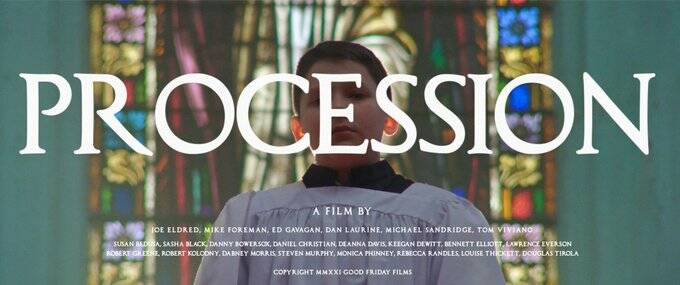Procession a harrowing, haunting revisit of abuse
Advertisement
Read this article for free:
or
Already have an account? Log in here »
To continue reading, please subscribe:
Monthly Digital Subscription
$0 for the first 4 weeks*
- Enjoy unlimited reading on winnipegfreepress.com
- Read the E-Edition, our digital replica newspaper
- Access News Break, our award-winning app
- Play interactive puzzles
*No charge for 4 weeks then price increases to the regular rate of $19.00 plus GST every four weeks. Offer available to new and qualified returning subscribers only. Cancel any time.
Monthly Digital Subscription
$4.75/week*
- Enjoy unlimited reading on winnipegfreepress.com
- Read the E-Edition, our digital replica newspaper
- Access News Break, our award-winning app
- Play interactive puzzles
*Billed as $19 plus GST every four weeks. Cancel any time.
To continue reading, please subscribe:
Add Free Press access to your Brandon Sun subscription for only an additional
$1 for the first 4 weeks*
*Your next subscription payment will increase by $1.00 and you will be charged $16.99 plus GST for four weeks. After four weeks, your payment will increase to $23.99 plus GST every four weeks.
Read unlimited articles for free today:
or
Already have an account? Log in here »
Hey there, time traveller!
This article was published 27/11/2021 (1474 days ago), so information in it may no longer be current.
Procession, a new documentary available on Netflix, deals with a tragically familiar subject. Centring on six men sexually abused as boys by Catholic priests, it covers ground that has been exposed in investigative docs such as The Keepers and Deliver Us From Evil.
What is entirely different is the way Procession approaches its traumatic topic. The six men — Joe Eldred, Mike Foreman, Ed Gavagan, Dan Laurine, Michael Sandridge and Tom Viviano — are not passive interview subjects but active collaborators in this project. As the film’s opening credits make clear, they are working with director Robert Greene and professional drama therapist Monica Phinney to write, construct and film narratives that re-enact and reframe their pain.
This is a risky therapeutic process, and it makes for an uncertain documentary result. Procession isn’t a neat and clean piece of work. It goes where it has to go and sometimes ends up in difficult detours and devastating dead ends. But it also records an unpredictable, stop-and-start journey of healing, as the men confront their worst moments and work to reclaim their lives. For men who decades later are still dealing with feelings of self-hatred and guilt, these recreations are a chance to “put the shame back where it belongs,” according to one participant, not with the victims but with the perpetrators.
Procession is part of a recent wave of expanded documentaries, which can be uneven (Casting JonBenet) or absolutely extraordinary (The Act of Killing). Greene has worked in experimental hybrid formats before (Kate Plays Christine and Bisbee ’17), and here he’s interrogating the documentary process itself, leaning into a subjective and emotional framework that seeks to represent violence and trauma without feeling exploitational or intrusive.
Greene collaborates with the men over a three-year period in and around the Kansas City area where the abuse took place. One of the men regularly throws up on Sundays. Another is still sickened by the smell of incense used in church liturgy. And here they are, directly facing their pain, with several returning to the sites — lake houses, suburban homes, churches and schools — where their abuse took place.
One man isn’t ready for this, so with the help of the others, he carefully builds a scale replica of the room where his abuse began — and then destroys it, after filming his re-enacted scenario, with a sledgehammer.
One man just wants to speak with himself as a child in his scene. Another man needs to vent his rage, not at the man who raped him when he was 11 years old but at the investigative board that dismissed his claims decades later.
The reimagined and re-enacted narratives are a fluid mix of experiences, emotions and memories. Sometimes they depict terrible — though never graphic – situations, and sometimes they enact wish-fulfillment fantasies in which the child escapes. The aim is to get the men to externalize their pain and then process it in a different way.
These films-within-the-film possess moments of astonishing and surreal power, but the process of creating them is perhaps even more powerful, as we see the men support each other through setbacks and breakthroughs. “Sometimes you can do for other people what you can’t do for yourself,” says one of the men.

A testament to the potential of film and to the possibilities of the collective creative experience, Procession is harrowing but not without hope.
gillmor@freepress.mb.ca

Studying at the University of Winnipeg and later Toronto’s York University, Alison Gillmor planned to become an art historian. She ended up catching the journalism bug when she started as visual arts reviewer at the Winnipeg Free Press in 1992.
Our newsroom depends on a growing audience of readers to power our journalism. If you are not a paid reader, please consider becoming a subscriber.
Our newsroom depends on its audience of readers to power our journalism. Thank you for your support.

